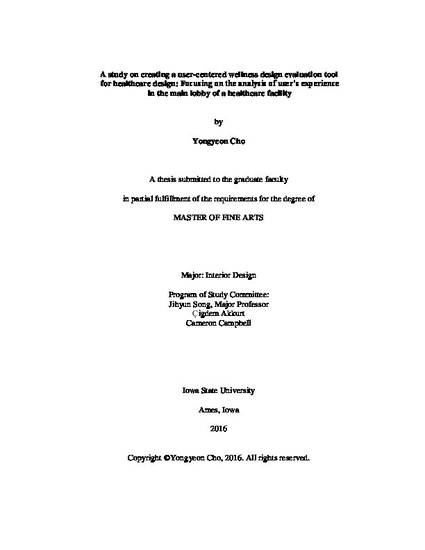
The goal of this study is to create an evidence-based evaluation tool for a healthcare facility’s main entry lobby that will improve the physical, emotional, and social experiences of users. A combination of content analysis and an online survey was used to create valid evaluation criteria for the design of a healthcare facility’s main entry lobby. Relevant theories and literature were reviewed to better understand the concept of wellness and design issues that could affect a user’s wellness within a healthcare environment. Five wellness design criteria were identified: 1. user experience, 2. positive distractions, 3. sense of control, 4. social interaction, and 5. safety and security. These criteria served as the major standards for developing the wellness design tool. The thesis used a mixed method that combined quantitative and qualitative methods of content analysis. Using the qualitative method, six existing healthcare evaluation tools and design guidelines were investigated, identifying twenty different wellness design features and their details. The quantitative method, explored how users of a healthcare facility perceived the selected wellness design features after their visit to the healthcare lobby. An online survey was administered in Iowa for 275 participants. Results of the questionnaire indicated that enhancement of safety and security was the most important consideration in designing a healthcare facility’s main entry lobby for improving users’ overall wellness experience, while providing optimal positive distractions was the most important consideration with respect to promoting users’ emotional wellness experience. Due to the limitation of study using a majority of local and domestic participants, the results did not represent the U.S population. However, the study provided a framework for creating and validating wellness design evaluation criteria as a design tool for future research.
Available at: http://works.bepress.com/yongyeon-cho/1/
